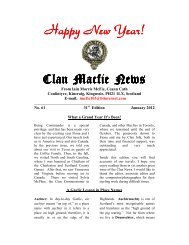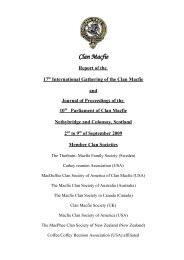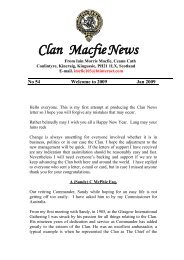Mythology, traditions and history - The Clan Macfie Society
Mythology, traditions and history - The Clan Macfie Society
Mythology, traditions and history - The Clan Macfie Society
Create successful ePaper yourself
Turn your PDF publications into a flip-book with our unique Google optimized e-Paper software.
- 16 -<br />
1759-65 - When the French had lost Quebec it was assumed that the French-Indian-war<br />
might stop. In fact a "Pontiac War" with the Indians continued.<br />
1760 - Scots moved to Pennsylvania.<br />
1769 - It is reported that some disb<strong>and</strong>ed Fraser Highl<strong>and</strong>ers moved from Canada to<br />
Pennsylvania.<br />
1171-75 - This was the heaviest influx of Scotch-Irish settlers prior to the Revolutionary<br />
war. Possible 30,000 to 50,000 left Ulster depriving its manufacturies of skilled labor.<br />
Westmorel<strong>and</strong> County had been developed. Dickson, in the Appendixes to his volume lists the<br />
boats involved in this transfer. 1<br />
1770-75 - Leyburn provides an answer to a problem I have met at various times, that<br />
43,720 passengers had moved to America. I wondered why this total had been obtained. <strong>The</strong><br />
answer is that between 1769 <strong>and</strong> 1774 I have noticed in these five years, sailing ships with total<br />
emigrants of 43,720. 2 <strong>The</strong> assumption was made that the number of emigrants, would equal the<br />
number of tons of shipping. This ratio was apparently accepted by the owners of the vessel.<br />
<strong>The</strong>re were exceptions to this rule of thumb. Guillet refers to ships in which 450 passengers<br />
were loaded on to a vessel of 300 tons, where twenty five persons had no accommodation, on a<br />
voyage to North Carolina, until other people, who had had accommodation, died. 3 <strong>The</strong><br />
Passenger Act of 1803 limited the number of passengers to one for every two tons; it was<br />
amended in 1817 to one passenger for every 1-1/2 tons; in 1823 the ratio was a passenger for<br />
five tons; in 1826 Irel<strong>and</strong> was exempted <strong>and</strong> the Act was repealed in 1827. Agents went back<br />
to excessive over crowding. Regulations continued to be proclaimed <strong>and</strong> forgotten <strong>and</strong> only<br />
the passing of the sailing ship drove these marauders out of the transport of honest citizens.<br />
1740-1800 - Pennsylvania became a clearing house for persons from Ulster - to Kentucky,<br />
Tennessee, Carolinas, Ohio, Indiana, <strong>and</strong> later still to Iowa, Mississippi <strong>and</strong> Missouri.<br />
1790 - Hanna reports that the Scotch-Irish immigrants amounted to 80,000. 4 Dunaway<br />
reports that 200,000 had emigrated from 1750-1800, according to Newenham. Leyburn<br />
considers that more than 250,000 in the 1790 census had Scotch-Irish ancestry. 2<br />
1790 - Census of 1790. <strong>The</strong> publication "Heads of Families" for Pennsylvania provides the<br />
names of persons of the clan. 5<br />
1 Dickson, R.J.; Op. cit. Appendices<br />
2 Leyburn, Jas, G.; op. cit. p. 181-183.<br />
3 Guillet, E.C.; <strong>The</strong> Great Migration, Toronto, 1937 <strong>and</strong> 1963. Chap. II.<br />
4 Hanna, C.A.; <strong>The</strong> Scotch Irish. Vol. I. p. 83<br />
5 Heads of Families - Pennsylvania, Reprint Co.






